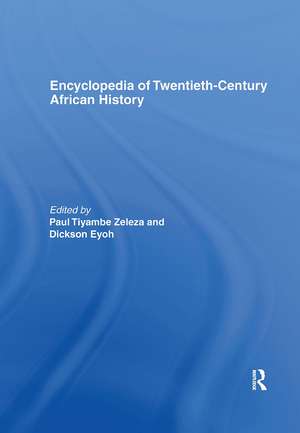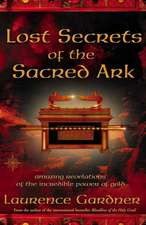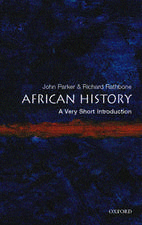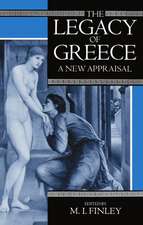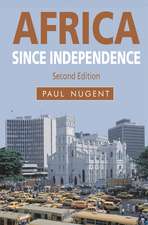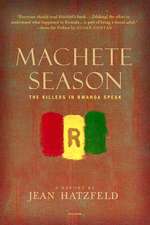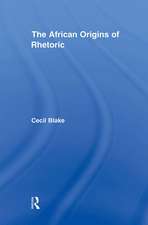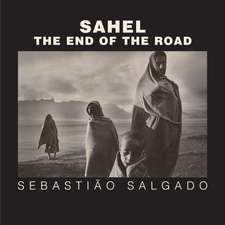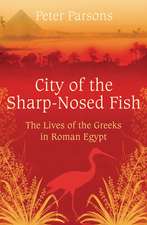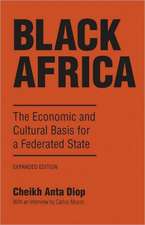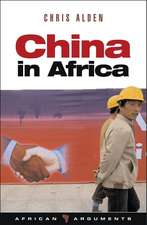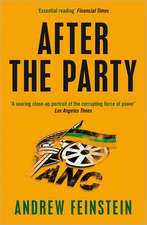Encyclopedia of Twentieth-Century African History
Editat de Dickson Eyoh, Paul Tiyambe Zelezaen Limba Engleză Hardback – 31 oct 2002
Choice Outstanding Academic Title 2004
| Toate formatele și edițiile | Preț | Express |
|---|---|---|
| Paperback (1) | 517.19 lei 6-8 săpt. | |
| Taylor & Francis – 18 aug 2015 | 517.19 lei 6-8 săpt. | |
| Hardback (1) | 2231.24 lei 6-8 săpt. | |
| Taylor & Francis – 31 oct 2002 | 2231.24 lei 6-8 săpt. |
Preț: 2231.24 lei
Preț vechi: 2721.02 lei
-18% Nou
Puncte Express: 3347
Preț estimativ în valută:
426.93€ • 445.80$ • 352.56£
426.93€ • 445.80$ • 352.56£
Carte tipărită la comandă
Livrare economică 15-29 aprilie
Preluare comenzi: 021 569.72.76
Specificații
ISBN-13: 9780415234795
ISBN-10: 0415234794
Pagini: 672
Dimensiuni: 178 x 254 x 41 mm
Greutate: 1.4 kg
Ediția:1
Editura: Taylor & Francis
Colecția Routledge
Locul publicării:Oxford, United Kingdom
ISBN-10: 0415234794
Pagini: 672
Dimensiuni: 178 x 254 x 41 mm
Greutate: 1.4 kg
Ediția:1
Editura: Taylor & Francis
Colecția Routledge
Locul publicării:Oxford, United Kingdom
Public țintă
Postgraduate and UndergraduateNotă biografică
Educated in Malawi, Britain and Canada, Paul Tiyambi Zeleza is a distinguished historian, writer and scholar. He has taught at universities in Malawi, Kenya, Jamaica, Canada and the United States. He is the author of over a dozen books, two of which won the 1994 Noma Award and the 1998 Special Commendation of the Noma Award, respectively, Africa's most prestigious book award.
Dickson Eyoh is a Cameroonian-born Political Scientist currently teaching at the Univeristy of Toronto, Canada. Educated in Cameroon, the United States and Canada, he has also taught at York University in Canada and University of Jos in Nigeria.
Dickson Eyoh is a Cameroonian-born Political Scientist currently teaching at the Univeristy of Toronto, Canada. Educated in Cameroon, the United States and Canada, he has also taught at York University in Canada and University of Jos in Nigeria.
Recenzii
'A welcome and significant addition to the reference material on modern Africa. Authoritative, balanced and scholarly, it is an essential purchase for all libraries supporting those engaged in the study of the continent. For other libraries with no specific interest in Africa this is still an acquisition that should be given serious consideration.' - Reference Reviews, May 2003
'This Encyclopedia offers a rich collection of interpretation and analysis of the major economic, political, social and cultural changes that Africa underwent in the 20th century. It is an outstanding reference resource that will be an essential acquisition not only for African studies library collections, but also for other academic and major public libraries.' - The African Book Publishing Record
'This Encyclopedia offers a rich collection of interpretation and analysis of the major economic, political, social and cultural changes that Africa underwent in the 20th century. It is an outstanding reference resource that will be an essential acquisition not only for African studies library collections, but also for other academic and major public libraries.' - The African Book Publishing Record
Cuprins
Abidjan, Cote d'Ivoire; Accra, Ghana; Addis Ababa, Ethiopia; African Development Bank; African diasporas; African religions; agrarian change; alcohol and drugs; Alexandria, Egypt; Algeria; Algiers, Algeria; Anglophone Africa; Angola; Antananarivo, Madagascar; Arab Maghreb Union; Arabic; architecture; Asmara, Eritrea; Bamako, Mali; Bangui, Central African Republic; Banjul, Gambia; Benin; Bissau, Guinea-Bissau; Blantyre, Malawi; Botswana; Brazzaville, Congo; Bujumbura, Burundi; Bulawayo, Zimbabwe; Burkina faso; Burundi; Cairo, Egypt; Cameroon; Cape Town, South Africa; Cape Verde; capitalisms and capitalists; Casablanca, Morocco; Central Africa; Central African Federation; Central African Republic; Chad; Christian reform movements; Christianity; cinema; civil society; Cold War; colonial Africa; colonial conquest and resistance; Common Market of Eastern and Southern Africa (COMESA); Commonwealth, the; Comoros; Conakry, Guinea; Congo; Cote d'Ivoire; Cotonou, Benin; Dakar, Senegal; dance; Dar es Salaam, Tanzania; debt crises; decolonization; Democratic Republic of the Congo; development of African history; Djibouti; Douala, Cameroon; Durban, South Africa; East Africa; East African Community; Economic Community of West African States; economy: colonial; economy: post-independence; education: colonial; education: post-independence; Egypt; environmental change; environmental movements; Equatorial Guinea; Eritrea; Ethiopia; European Union, the; families; First World War; food crises; Francophone Africa; Freetown, Sierra Leone; French Equatorial Africa; French West Africa; Fulani; Gabon; Gaborone; Gambia; genocides; Ghana; Globalization; Great Depression; Great Lakes; Guinea; Guinea-Bissau; Harare, Zimbabwe; Hausa; health and disease; human rights; Ibadan, Nigeria; intellectuals: colonial era; intellectuals: post-independence era; international financial institutions; international trade; Islam; Islamic reform movements; Johannesburg, South Africa; Juba, Sudan; Kampala, Uganda; Kano, Nigeria; Kenya; Khartoum, Sudan; Kigali, Rwanda; Kinshasa, Democratic Republic of the Congo; Kumasi, Ghana; La Francophonie; labour movements; Lagos, Nigeria; law; League of Arab States; leisure; Lesotho; Liberia; Libya; Lingala; literature; Lome, Togo; Luanda, Angola; Lubumbashi, Democratic Republic of Congo; Lusaka, Zambia; Lusophone Africa; Madagascar; Malawi; Mali; manufacturing: indigenous; manufacturing: modern; Maputo, Mozambique; Maseru, Lesotho; Mauritania; Mauritius; Mbabane, Swaziland; merchants; migrant labour; Mogadishu, Somalia; Mombasa, Kenya; Monrovia, Liberia; Morocco; Mozambique; music; N'djamena, Chad; Nairobi, Kenya; Namibia; nationalist movements; Niamey, Niger; Niger; Niger Delta; Nigeria; non-African diasporas; Non-Aligned movement; Non-Governmental Organizations (NGOs); North Africa; Nouakchott, Mauritania; Organization of African Unity; Organization of Islamic Conference (OIC); Ouagadougou, Burkina Faso; pan-Africanism; pastoralism; peasant movements; peasants; plantation agriculture; population; Press, the; professionals; Rabat, Morocco; race and ethnicity; radio and television; refugees; regional integration; Rift Valley; Rwanda; Sahara; Sao Tomé and príncipe; Savanna; Second World War; Senegal; sex and sexuality; Seychelles; Sierra Leone; slavery; socialisms and socialists; society: colonial; society: post-independence; Somalia; South Africa; Southern Africa; Southern African Development Community; sports; state: colonial; state: post-independence; structural adjustment programmes; Sudan; Swahili; Swaziland; Tanzania; telecommunications; theatre; Third World; Togo; trading diasporas; transport; Tripoli, Libya; tropical rain forest; Tunis, Tunisia; Tunisia; Uganda; United Nations Organization; urbanization; visual arts; West Africa; Windhoek, Namibia; women's movements; workers; Yaounde, Cameroon; Yoruba; youth; Zambia; Zanzibar, Tanzania; Zimbabwe; Zulu
Descriere
With over two hundred individually signed entries, this Encyclopedia explores the ways in which the peoples of Africa, their polities, states, societies, economies, environments, cultures and arts were transformed during the twentieth century.
